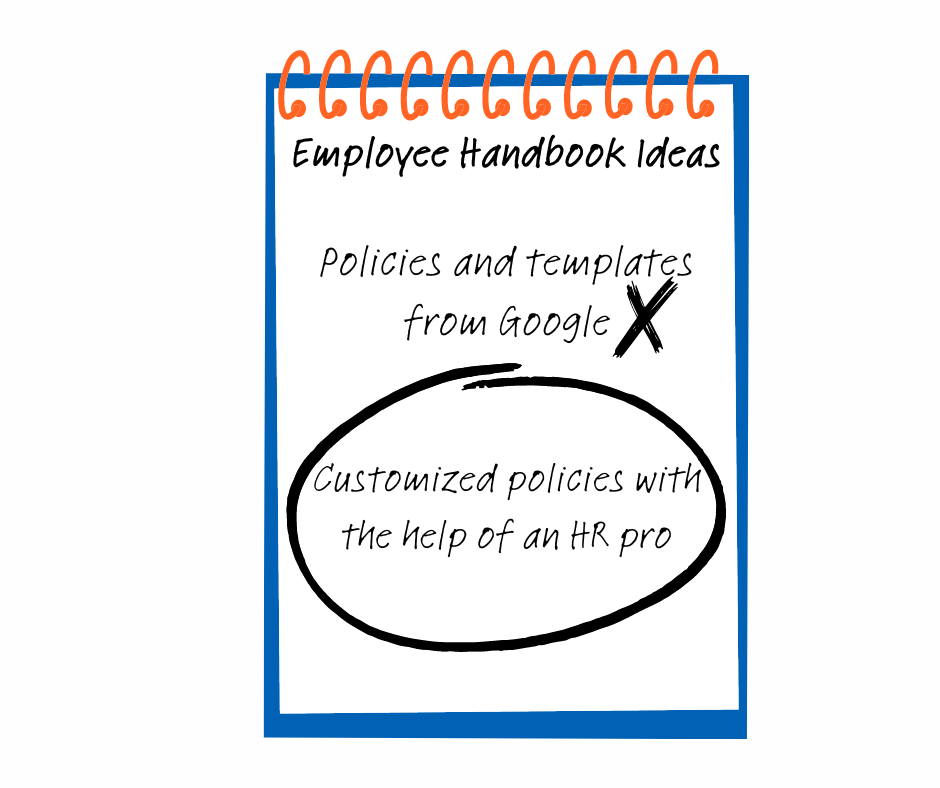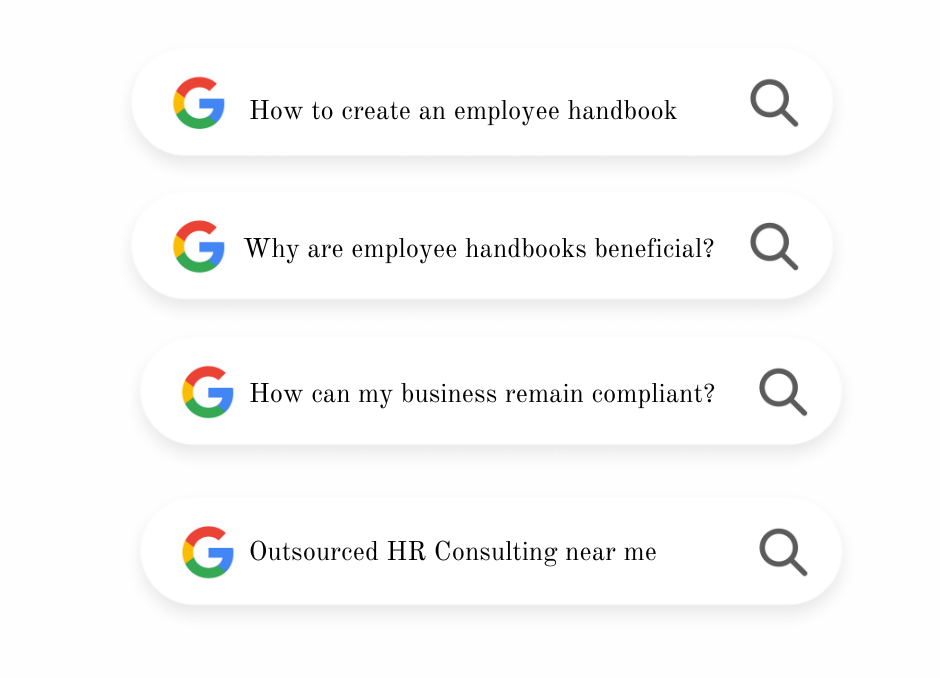When it comes to your employee handbook, clarity and compliance are essential!
An employee handbook should offer guidance, structure, and a clear path to success for employers and employees.
But compliance and clarity may be at risk if you decide to craft an employee handbook based on policies and templates you’ve found online…

Google does not have an HR degree.
As a leader, you are responsible for ensuring that everyone on your team understands the expectations and your business complies with legal requirements.
That’s why, at Castle HR, we firmly believe that establishing a custom employee handbook for your business is essential to creating a successful, productive workplace and remaining compliant.
Crafting a custom employee handbook does take more time, but it’s well worth it in the end, as having one can help you avoid lawsuits and keep your entire team aligned.
So, let’s delve into the intricacies of employee handbooks, explore their indispensable role within modern organizations, and break down why templates are never the answer!
What Is The Purpose Of An Employee Handbook?
An employee handbook serves as a navigational guide for employees and employers alike.
It imparts a sense of direction, aligns everyone with the company’s policies, mission and values, and steers the entire team toward a unified destination.
If customized and crafted well, it will echo your company’s voice and authenticity and, most importantly, provide your employees with documented, accurate policies to ensure compliance.
When Do Businesses Require An Employee Handbook?
While employee handbooks aren’t legally required, we recommend that business owners have one as soon as they hire employees.

Essentially, even with a small team, your handbook will safeguard you and protect all that you’ve built (and are currently building).
Whether you have a small team or are just beginning the onboarding process, we recommend implementing a handbook sooner rather than later. With that said, an employee handbook should be designed with your growing company in mind – that is another reason we encourage customization!
There are some policies, like a Sexual Harassment policy, that are mandatory to have once you have 5 people on your team. Once you have 50 people on board, you’ll need an AODA policy.
What Does An Employee Handbook Contain?
An employee handbook should contain the following:
Legal Policies
These include crucial policies like Sexual Harassment, Workplace Violence, Safety, Attendance, and Compensation & Benefits. An organization safeguards its employees and legal standing by adhering to these policies.
Best Practice Policies
These guidelines address dress codes, vacation policies, technology and/or AI etiquette, and more. While not legally mandated, they set the tone for professionalism and cultivate a harmonious workplace and winning culture!
Company-Specific Policies
This section tailors the handbook to the organization’s unique characteristics, encompassing policies related to Remote Work, Company Property usage, and other specific guidelines that reflect the company’s identity.
Do All Businesses Need An Employee Handbook?
While they are not legally required, as mentioned earlier, the absence of an employee handbook can give rise to a plethora of challenges.
Confusion reigns without clear policies and guidelines, potentially leading to inconsistencies, lowered morale, and even legal complications.
Misinterpretations of company culture and expectations can lead to disengaged employees and hindered productivity.
Additionally, compliance with ever-evolving legal mandates becomes perilous, putting the organization at risk. Simply put: we highly recommend a (custom) employee handbook to mitigate these issues. (If you need help crafting yours, don’t hesitate to reach out to us).
Why Should You Customize Your Employee Handbook?
A custom employee handbook tailored to the organization’s identity ensures alignment, relevance, and, most importantly, legal adherence.
You can also incorporate your branding and personality into the document with a custom employee handbook.
Using templates and policies from other handbooks found on the internet may seem tempting. But trust us…
When it comes to creating an employee handbook, templates are the enemy!
Templates often lack the contextual precision to capture and communicate a company’s ethos accurately. And they may also inadvertently include outdated or irrelevant information, which can risk you and everyone else in your business.
What Are The Benefits Of Having An Employee Handbook?
The benefits of having an employee handbook (especially a custom one) are profound.

Here’s how a well-made, custom employee handbook (not just templates) can benefit your business:
Risk reduction and compliance
Policies are ever-changing, and no ‘one size fits all’ solution exists.
Rather than taking chances and putting policies in your handbook that isn’t suited to your exact business/needs, establishing a custom employee handbook is a proactive step you can take to ensure your company is protected and compliant!
Value and culture alignment
You have an authentic culture! When tailoring a custom employee handbook, you (or an HR professional) will use those values to craft the tonality and ensure that your handbook nurtures your winning culture.
Your custom employee handbook should be an extension of your company’s beliefs and values and will reduce the chances of having contradicting or unclear policies that don’t align with your values (this often happens with templates).
Professionalism
Having your custom employee handbook communicates to your team that you’re a professional and authentic organization. A–Players will want to join your team, and your new hires will take pride in knowing they work for a dedicated and organized employer.
Here’s a fun Castle HR fact…
We do a baseline survey with each of our clients. We ask their teams, ‘Is [company/name] making this the best workplace?’
We conduct the survey again after 6 months and often notice an uptick in positive responses whenever a custom employee handbook has been implemented!
Are Employee Handbooks Legally Binding?
An employee handbook in and of itself is not technically legally binding. But, there can be content within a handbook that may be interpreted as a contractual promise.
For instance, a handbook could be legally enforceable if a component is seen as an extension of the employment agreement. If portions of your employee handbook are legally binding, you should have a statement in it that clearly says so and require your employee’s signature. This can strengthen your company’s position if litigation occurs.
This is why we:
-
- Continuously stress consistent messaging
- Encourage custom handbooks with policies tailored to your company
- Advise you to enlist the help of an HR professional to guide you through the employee handbook creation process
Do Employees Have To Sign An Employee Handbook?
Although not (automatically) a legally binding document, you should always ensure that employees sign off to protect your business.
Without a valid signature, it doesn’t exist in the eyes of the law because you’ll be unable to prove that they have read your employee handbook.
Simply put, if you have an employee handbook in place, it should be a requirement at your company (outlined in your contract, perhaps) that employees read and sign off.
Will My Employee Handbook Have To Be Updated?
Yes, you should review your employee handbook and all policies every 12-18 months, even if you create a custom one.

Outdated policies aren’t protecting your business, and policies can change yearly.
An employee handbook is meant to be a living document; no single version will be evergreen, so someone must update this document.
As your team scales and evolves, someone must assume ownership of your handbook and update this document to reflect the current landscape and remain compliant.
This could be a member of your leadership team or, most often, an HR professional. For instance, at Castle HR, compliance is our primary focus; we own our clients’ updates and inform them of any policy changes.
FYI: Your team must be informed of changes to your custom employee handbook!
Should Employee Handbooks Use Formal Language?
While the document should be taken seriously, you do not need to write in legalese!
Your team should be able to understand the information in your handbook, so it’s important to remain authentic and speak their language.
You may also wish to incorporate your brand colours and personality in your design for a custom and professional experience…Castle HR can help with your branding, design and language!
Formal documentation does not have to be stale and boring!
How Castle HR Can Help With Custom Employee Handbooks
In case you haven’t already guessed, we aren’t fans of templates at Castle HR because they may seem tempting to startups and small businesses, but they put those businesses at risk in many ways. They also typically lack personal and professional touch, which isn’t doing anyone any favours.
Luckily, we can help – handbooks are our jam! We have helped create 100+ custom employee handbooks for our clients.
Business owners are often relieved when we sit down with them and systematically go through ~80 policies to understand which ones are necessary. Once we have the policies we need, we customize them and draft them for their business.
Creating a practical, custom employee handbook is no small undertaking and should include HR and legal advice. And, to have the best custom employee handbook, you’ll need to work with someone who has been in your position before.
As we mentioned earlier, Google doesn’t have an HR degree, and your employee handbook is something you need to get right the first time.

This is one of the reasons we require our HR professionals to have at least 10 years of experience before joining Castle HR – they’ve got firsthand experience and understand the needs of small businesses.
We’ve got your back if you need assistance with creating your custom employee handbook – from understanding policies (legally required and best practices) to design and implementation. Book a call with us today.

Lyndsy has been working in the HR realm for over two years and has experience in content management, ghostwriting and copywriting. She holds a Bachelor’s in English and Cultural Studies and considers herself a lifelong learner and passionate storyteller. Regarding modern HR, Lyndsy believes businesses can stand out as ‘top destinations’ for talented people by adopting a people-centred approach and fostering a strong culture; that’s one of the reasons she was drawn to Castle HR!